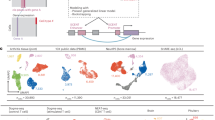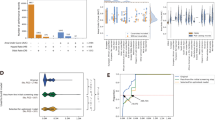Abstract
Effects of susceptibility variants may depend on from which parent they are inherited. Although many associations between sequence variants and human traits have been discovered through genome-wide associations, the impact of parental origin has largely been ignored. Here we show that for 38,167 Icelanders genotyped using single nucleotide polymorphism (SNP) chips, the parental origin of most alleles can be determined. For this we used a combination of genealogy and long-range phasing. We then focused on SNPs that associate with diseases and are within 500 kilobases of known imprinted genes. Seven independent SNP associations were examined. Five—one with breast cancer, one with basal-cell carcinoma and three with type 2 diabetes—have parental-origin-specific associations. These variants are located in two genomic regions, 11p15 and 7q32, each harbouring a cluster of imprinted genes. Furthermore, we observed a novel association between the SNP rs2334499 at 11p15 and type 2 diabetes. Here the allele that confers risk when paternally inherited is protective when maternally transmitted. We identified a differentially methylated CTCF-binding site at 11p15 and demonstrated correlation of rs2334499 with decreased methylation of that site.
This is a preview of subscription content, access via your institution
Access options
Subscribe to this journal
Receive 51 print issues and online access
$199.00 per year
only $3.90 per issue
Buy this article
- Purchase on Springer Link
- Instant access to full article PDF
Prices may be subject to local taxes which are calculated during checkout



Similar content being viewed by others
References
Rampersaud, E., Mitchell, B. D., Naj, A. C. & Pollin, T. I. Investigating parent of origin effects in studies of type 2 diabetes and obesity. Curr. Diabetes Rev. 4, 329–339 (2008)
Kong, A. et al. Detection of sharing by descent, long-range phasing and haplotype imputation. Nature Genet. 40, 1068–1075 (2008)
Luedi, P. P. et al. Computational and experimental identification of novel human imprinted genes. Genome Res. 17, 1723–1730 (2007)
Morison, I. M., Paton, C. J. & Cleverley, S. D. The imprinted gene and parent-of-origin effect database. Nucleic Acids Res. 29, 275–276 (2001)
Morison, I. M., Ramsay, J. P. & Spencer, H. G. A census of mammalian imprinting. Trends Genet. 21, 457–465 (2005)
Hindorff, L. A., Junkins, H. A., Mehta, J. P. & Manolio, T. A. A Catalog of Published Genome-Wide Association Studies. OPG: Catalog Published Genome-Wide Assoc. Studies 〈http://www.genome.gov/gwastudies〉 (2009)
Stacey, S. N. et al. New common variants affecting susceptibility to basal cell carcinoma. Nature Genet. 41, 909–914 (2009)
Easton, D. F. et al. Genome-wide association study identifies novel breast cancer susceptibility loci. Nature 447, 1087–1093 (2007)
Thomas, G. et al. A multistage genome-wide association study in breast cancer identifies two new risk alleles at 1p11.2 and 14q24.1 (RAD51L1). Nature Genet. 41, 579–584 (2009)
Marchini, J., Howie, B., Myers, S., McVean, G. & Donnelly, P. A new multipoint method for genome-wide association studies by imputation of genotypes. Nature Genet. 39, 906–913 (2007)
Yasuda, K. et al. Variants in KCNQ1 are associated with susceptibility to type 2 diabetes mellitus. Nature Genet. 40, 1092–1097 (2008)
Unoki, H. et al. SNPs in KCNQ1 are associated with susceptibility to type 2 diabetes in East Asian and European populations. Nature Genet. 40, 1098–1102 (2008)
Storey, J. D. & Tibshirani, R. Statistical significance for genomewide studies. Proc. Natl Acad. Sci. USA 100, 9440–9445 (2003)
Devlin, B. & Roeder, K. Genomic control for association studies. Biometrics 55, 997–1004 (1999)
Georges, M., Charlier, C. & Cockett, N. The callipyge locus: evidence for the trans interaction of reciprocally imprinted genes. Trends Genet. 19, 248–252 (2003)
Ideraabdullah, F. Y., Vigneau, S. & Bartolomei, M. S. Genomic imprinting mechanisms in mammals. Mutat. Res. 647, 77–85 (2008)
Bell, A. C. & Felsenfeld, G. Methylation of a CTCF-dependent boundary controls imprinted expression of the Igf2 gene. Nature 405, 482–485 (2000)
Feinberg, A. P. Phenotypic plasticity and the epigenetics of human disease. Nature 447, 433–440 (2007)
Goldberg, M., Wei, M., Yuan, L., Murty, V. V. & Tycko, B. Biallelic expression of HRAS and MUCDHL in human and mouse. Hum. Genet. 112, 334–342 (2003)
Authier, F., Metioui, M., Fabrega, S., Kouach, M. & Briand, G. Endosomal proteolysis of internalized insulin at the C-terminal region of the B chain by cathepsin D. J. Biol. Chem. 277, 9437–9446 (2002)
Parker-Katiraee, L. et al. Identification of the imprinted KLF14 transcription factor undergoing human-specific accelerated evolution. PLoS Genet. 3, e65 (2007)
Emilsson, V. et al. Genetics of gene expression and its effect on disease. Nature 452, 423–428 (2008)
Kim, T. H. et al. Analysis of the vertebrate insulator protein CTCF-binding sites in the human genome. Cell 128, 1231–1245 (2007)
Cuddapah, S. et al. Global analysis of the insulator binding protein CTCF in chromatin barrier regions reveals demarcation of active and repressive domains. Genome Res. 19, 24–32 (2009)
Acknowledgements
Acknowledgements This project was funded in part by FP7-MC-IAPP Grant agreement no. 218071 (CancerGene) to deCODE genetics.
Author Contributions A.K. and K.S. planned and directed the research. A.K. wrote the first draft of the paper and, together with K.S., V.S., G.M., G.T. and U.T., wrote most of the final version. A.K. and G.M. designed the method to determine parental origin. G.M., with assistance from P.I.O., implemented the algorithm. D.F.G. wrote the code for association analysis taking parental origin into account and performed some initial analyses. P.S., S.B. and S.S. tabulated the established disease-associated variants and the regions known to harbour imprinted genes. V.S. and G.T. contributed to the analysis of the diabetes data and, together with A.K. and U.T., planned the follow-up association and functional studies. A.G., A.K. and M.L.F. imputed the untyped SNPs. S.N.S. and P.S. were responsible for the breast cancer and basal-cell carcinoma data. A.B.H., G.S. and R.B. provided clinical data for T2D, O.Th.J., T.J. and H.S. provided clinical data for breast cancer, and J.H.O., B.S. and K.R.B. provided clinical data for basal-cell carcinoma. The DIAGRAM Consortium provided the novel T2D-associated variants that are close to imprinted genes. Aslaug J., A.S., Adalbjorg J., K.Th.K. and S.A.G. performed the methylation and expression studies. A.C.F.-S. assisted in the interpretation of the results from the association and functional studies.
Author information
Authors and Affiliations
Consortia
Corresponding authors
Ethics declarations
Competing interests
The authors from Decode Genetics Inc. own stocks and stock options in the company.
Additional information
Lists of participants and affiliations appear at the end of the paper.
Supplementary information
Supplementary Information
This file contains Supplementary Notes, Supplementary Tables 1-9, Supplementary Figures 1-4 with Legends and Supplementary References. (PDF 355 kb)
Rights and permissions
About this article
Cite this article
Kong, A., Steinthorsdottir, V., Masson, G. et al. Parental origin of sequence variants associated with complex diseases. Nature 462, 868–874 (2009). https://doi.org/10.1038/nature08625
Received:
Accepted:
Issue Date:
DOI: https://doi.org/10.1038/nature08625
This article is cited by
-
Phenome-wide analyses identify an association between the parent-of-origin effects dependent methylome and the rate of aging in humans
Genome Biology (2023)
-
A family-based study of genetic and epigenetic effects across multiple neurocognitive, motor, social-cognitive and social-behavioral functions
Behavioral and Brain Functions (2022)
-
The contribution of imprinted genes to neurodevelopmental and neuropsychiatric disorders
Translational Psychiatry (2022)
-
Characterization of the genetic architecture of infant and early childhood body mass index
Nature Metabolism (2022)
-
Large parental differences in chromatin organization in pancreatic beta cell line explaining diabetes susceptibility effects
Nature Communications (2021)
Comments
By submitting a comment you agree to abide by our Terms and Community Guidelines. If you find something abusive or that does not comply with our terms or guidelines please flag it as inappropriate.



